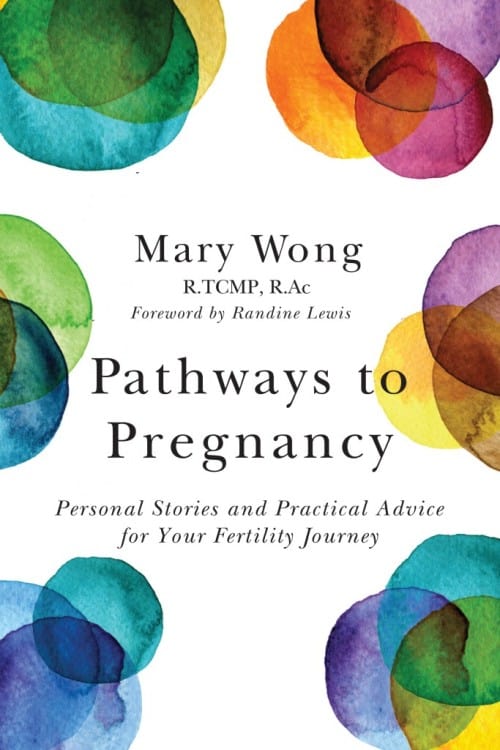Mary Wong is the founder of Toronto’s ALIVE clinic and an advisor to federal policy on infertility in Canada. She has helped thousands of couples conceive their first children. In her new book, Pathways to Pregnancy, Wong offers a moving and eye-opening voice to the national conversation about conceiving. She too struggled with infertility, so she understands firsthand the pain and heartache involved with trying to get pregnant.
We found out some practical tips and strategies couples can use to navigate this heart-wrenching journey.
SDTC: What can couples do to increase their fertility?
MW: When one in six experience infertility in their lifetime and fifteen to twenty-five per cent of all pregnancies end up in miscarriage, there are a myriad of affordable ways people can increase their fertility. Because each person is individual and unique, what works for one woman may not work for another; however, here are three tips I recommend if you are trying to conceive:
1) Eat whole and nutritious foods. Rather than buying pre-packaged and fast foods, buy non-processed organic foods, which you can find around the perimeter of your local grocery store. This ensures more nutrition, which helps to provide the building blocks to making a baby. This helps to take care of your preconception health.
2) Practice daily meditation. Shift your focus from being stuck in your head to being in the present moment in your body. This lowers your stress hormone, which may increase your chances to conceive. Meditation can be practiced in many ways. If you stress about the idea of sitting still to meditate, consider doing daily walking or eating meditations, during which you are fully engaged with nature, or what you are eating with every bite (rather than eating on the run).
3) Focus on intimacy and lovemaking instead of baby-making sex. This includes holding hands, hugging, kissing every day (not just when you are ovulating) and meaningful conversation. This releases the love hormone oxytocin, which will keep your love alive and your stress hormones low to help you conceive.
What impact do our work schedules have on fertility?
The demands of work and the secrecy around trying to conceive add layers of stress, which makes baby-making challenging. This is especially true if you go for cycle monitoring at a fertility clinic. Daily blood work, ultrasound, and consultation with the doctor or nurse to track ovulation makes getting to work logistically impossible. And when you add procedures like IUI (inseminations) and IVF with fertility drugs, it’s a wonder how anyone manages to work at all.
So, along with my tips to enhance fertility above, I have the following advice for working women:
1) Eat nutritiously. Bring healthy snacks and lunches to work and do not skip meals
2) Share your difficulty with one person at work who can cover for you when you are late, be empathetic to your needs, and deflect questions
3) Be realistic as to how much work you can take on. This is not the time to add extra projects. Try telecommuting or flexible work hours to help ease stress

Why does trying so hard to have a baby sometimes work against you?
Doing more does not always equate to getting a baby in your belly faster. It may increase your stress levels and decrease happiness. The stress of trying to conceive along with other life stressors and trying to do everything right in order to get pregnant may put you in a fight or flight survival mode where energy gets diverted away from your reproductive organs.
So when a patient asks me, “What more can I do to get pregnant?” I ask, “What one thing can you let go of every day? Focus more on how you are ‘being’ in what you are ‘doing’.” One way is to add laughter into your life. Laughter not only releases endorphins but also helps to decrease stress response, relax the uterus, and increase uterine blood flow. This helps you be happier in the moment. An Israeli study found that laughter after IVF embryo transfer increased pregnancy rates by fifteen per cent.

Author Mary Wong
How can we be supportive to friends and family who are experiencing infertility?
Empathy is key. It is appropriate to say that you do not fully understand what your friend or family member is going through. Saying, “I am here for you at whatever capacity you need” will be helpful.
Be upfront and ask what she needs. Each person experiences fertility challenges differently. Some prefer not to talk about it while others, like myself, find it helpful to vent about the difficulties without fear of being judged. You may say, “I am here for you if you want to talk. If you prefer not to, that’s okay too.”
The best support is to keep your judgements to yourself. Although you may have loving intentions, refrain from saying things like, “Just relax and you’ll get pregnant,” “You don’t want them. They’re a lot of work,” or “You can always adopt.” Rather than helpful, these comments are hurtful and will cause anyone going through fertility challenges to shut down.

Can you talk about your own experience with overcoming infertility?
I had made it my life’s mission to bridge the gap between Eastern and Western medicine. As a practitioner of Chinese medicine and acupuncturist, I led a healthy lifestyle and assumed that I would get pregnant easily when the time came. When we didn’t, we went to the fertility clinic and found out that I had irreversible fluid-filled blocked Fallopian tubes at forty. I was in utter shock. I have helped thousands of couples conceive. I never expected that I would have trouble myself. And never in a million years did I believe that I would have to embrace IVF (fertilization in a petri dish). But when egg and sperm could never meet, that’s what we did, not once but six times.
Today, I am forever grateful that after years of struggle, Zoe came to our lives in 2012 when we integrated Eastern and Western medicine. I am more than a practitioner offering advice. I am human and not immune to life’s challenges. I have walked a difficult pathway to pregnancy and triumphed. I want others to know that they can too.



 Follow Us On Instagram
Follow Us On Instagram
